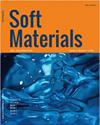Chitosan-coated poly(є-caprolactone) nanocapsules for mucoadhesive applications of perillyl alcohol
IF 1.4
4区 材料科学
Q4 MATERIALS SCIENCE, MULTIDISCIPLINARY
引用次数: 4
Abstract
ABSTRACT Perillyl alcohol (POH) is an essential oil found in several plants and presents significant therapeutic and chemo-preventive activity against some tumors. However, it exhibits low aqueous solubility and thereby reduced oral absorption and bioavailability. Nanoencapsulation of POH can be an important tool to overcome such limitations. In this work, chitosan was used for coating poly (ε-caprolactone) nanocapsules for mucoadhesive applications of POH. The nanocapsules were obtained by the nanoprecipitation method and presented a mean diameter of about 330 nm, spherical morphology, polydispersity index of 0.14, zeta potential of +32 mV, and POH encapsulation efficiency of 56%. POH was prolonged released from nanocapsules. In mucoadhesion studies, nanocapsules showed higher adsorption to mucin compared to free POH, possibly due to electrostatic interactions between chitosan and mucin. In the cytotoxicity assay, POH-loaded nanocapsules presented higher IC50 than free POH; however, they were more selective for HT-29 tumor cells than for normal Vero cells. The results demonstrate the potential application of chitosan-coated nanocapsules for the oral administration of POH intended for cancer therapy.壳聚糖包被聚(є-caprolactone)纳米胶囊紫苏醇粘接应用
紫苏醇(Perillyl alcohol, POH)是一种存在于多种植物中的精油,对某些肿瘤具有显著的治疗和化学预防作用。然而,它的水溶性较低,因此降低了口服吸收和生物利用度。POH的纳米封装可以成为克服这些限制的重要工具。本研究采用壳聚糖包覆聚ε-己内酯纳米胶囊,用于POH的粘接。采用纳米沉淀法制备的纳米胶囊平均直径约为330 nm,形貌为球形,多分散性指数为0.14,zeta电位为+32 mV, POH包封效率为56%。POH从纳米胶囊中释放时间延长。在黏附研究中,纳米胶囊比游离POH对粘蛋白表现出更高的吸附,这可能是由于壳聚糖和粘蛋白之间的静电相互作用。在细胞毒性实验中,负载POH的纳米胶囊的IC50值高于游离POH;然而,与正常的Vero细胞相比,它们对HT-29肿瘤细胞的选择性更强。结果表明壳聚糖包被纳米胶囊用于口服POH用于癌症治疗的潜在应用。
本文章由计算机程序翻译,如有差异,请以英文原文为准。
求助全文
约1分钟内获得全文
求助全文
来源期刊

Soft Materials
工程技术-材料科学:综合
CiteScore
2.90
自引率
0.00%
发文量
21
审稿时长
2.2 months
期刊介绍:
Providing a common forum for all soft matter scientists, Soft Materials covers theory, simulation, and experimental research in this rapidly expanding and interdisciplinary field. As soft materials are often at the heart of modern technologies, soft matter science has implications and applications in many areas ranging from biology to engineering.
Unlike many journals which focus primarily on individual classes of materials or particular applications, Soft Materials draw on all physical, chemical, materials science, and biological aspects of soft matter. Featured topics include polymers, biomacromolecules, colloids, membranes, Langmuir-Blodgett films, liquid crystals, granular matter, soft interfaces, complex fluids, surfactants, gels, nanomaterials, self-organization, supramolecular science, molecular recognition, soft glasses, amphiphiles, foams, and active matter.
Truly international in scope, Soft Materials contains original research, invited reviews, in-depth technical tutorials, and book reviews.
 求助内容:
求助内容: 应助结果提醒方式:
应助结果提醒方式:


